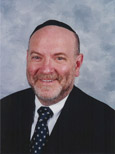HERE COMES d'JUDGE
By the CyberRav—Rabbi Rafi Rank
GOTTA QUESTION? THE CYBER RAV HAS AN ANSWER
AND GOOD NEWS--
THE CYBER RAV IS ALWAYS IN
SEND YOUR QUESTIONS TO
rafirank@mjc.org
YOUR IDENTITY WILL NOT BE REVEALED
CONFIDENTIALITY IS ASSURED
We always hear about the greatness of the Sage Hillel, but I have my doubts. I came across a passage in Pirkei Avot, Ethics of the Fathers, which I found terribly upsetting. The passage reads, “Judge not your fellow until you have been in that person’s place” (Pirkei Avot 2:5). I find this teaching fundamentally wrong because if you think about it, it is absolutely impossible to ever be in another person’s place. To be in that person’s place, one would have to have that person’s past experiences, genes, family, income, anxieties, etc. In other words, people may judge others thinking that that they have, in fact, arrived at another person’s place, but as far as I’m concerned, the idea is itself basically absurd. And who was it who proposed this? Hillel, the great sage. He doesn’t sound so great to me.
Unhappy About Hillel
Dear Unhappy About Hillel,
One of my great pleasures in life is to be able to agree with others in their literary analyses of sacred literature, and I’m about to have one such happy moment—I agree with you: It is impossible to ever truly occupy another person’s position. And it’s impossible for all the reasons you’ve delineated. We are who we are; they are who they are and never the twain shall meet. But I nevertheless think you may be missing Hillel’s point.
Hillel did not compose this passage in order to facilitate people’s penchant for judging others. He composed it for just the opposite reasons. How do I know? Maybe I don’t, at least not for certain, but the sin of Lashon Hara, evil speech or gossip or slander has been endemic to human nature for as long as humans have walked upright and gathered in malls, offices and at family celebrations. We judge family, friends, politicians, co-workers, bosses, mega-corporations, countries, and God knows we pass judgment on the President of the United States several times a day. We are very quick to judge others and some of us judge others with relish or malice.
Hillel understands this about human beings and he also understands, being a great pedagogue, how fruitless it is to demand good behavior. Rather than demand that others deny their own human nature, something which is near impossible to do, he sets up a guideline for us. You want to judge others—fine. But don’t do it until you are precisely in the same position as the fellow you are about to pass judgment on.
And if, as you say, it is impossible to so place yourself in another’s position, then the unfairness of passing judgment should follow from that quite clearly.
Human beings will never stop judging others. But Hillel, in his characteristic gentle manner, reminds us of the folly in so doing. What a great teacher and rabbi!
Rabbi Rafi Rank
The Cyber Rav

